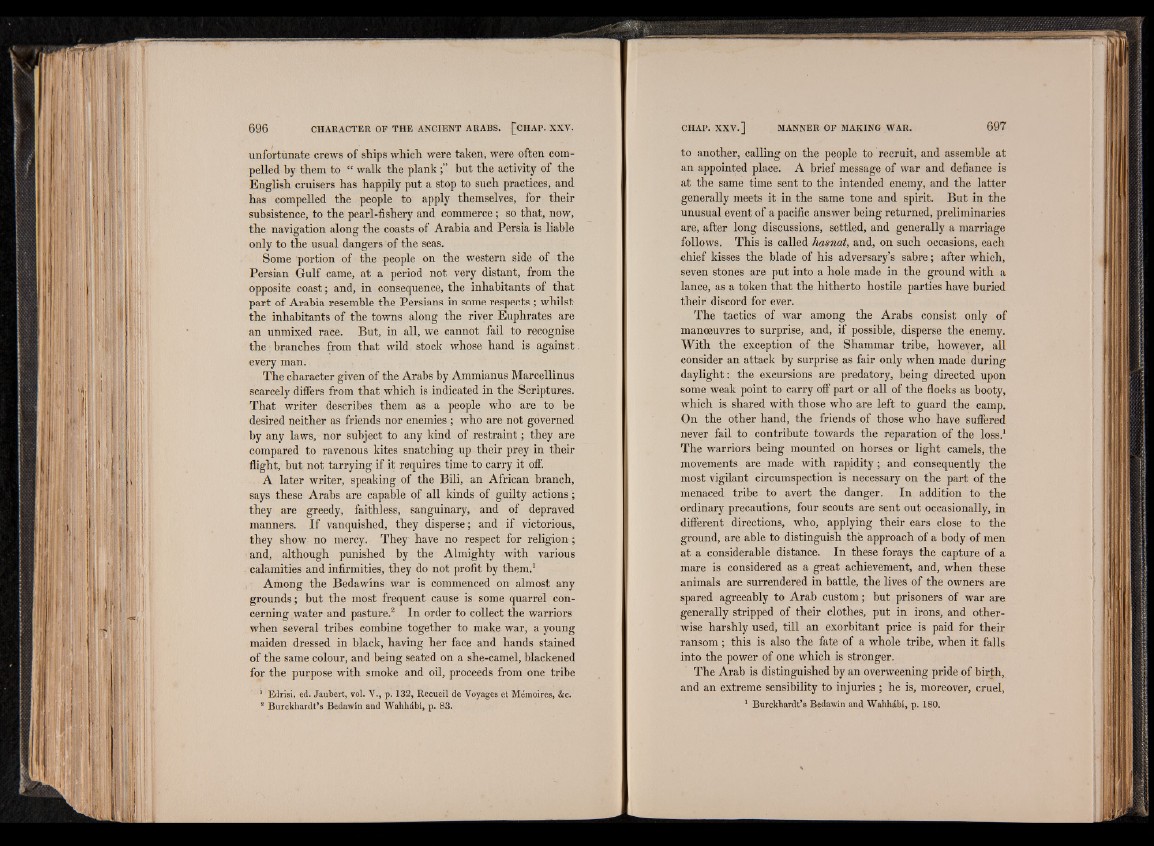
unfortunate crews of ships which were taken, were often compelled
by them to “ walk the plank ;” but the activity of the
English cruisers has happily put a stop to such practices, and
has compelled the people to apply themselves, for their
subsistence, to the pearl-fishery and commerce ; so that, now,
the navigation along the coasts of Arabia and Persia is liable
only to the usual dangers of the seas.
Some portion of the people on the western side of the
Persian Gulf came, at a period not very distant, from the
opposite coast; and, in consequence, the inhabitants of that
part of Arabia resemble the Persians in some respects ; whilst
the inhabitants of the towns along the river Euphrates are
an unmixed race. But, in all, we cannot fail to recognise
the1 branches from that wild stock whose hand is against
every man.
The character given of the Arabs by Ammianus Marcellinus
scarcely differs from that which is indicated in the Scriptures.
That writer describes them as a people who are to he
desired neither as friends nor enemies ; who are not governed
by any laws, nor subject to any kind of restraint ; they are
compared to ravenous kites snatching up their prey in their
flight, hut not tarrying if it requires time to carry it off.
A later writer, speaking of the Bili, an African branch,
says these Arabs are capable of all kinds of guilty actions ;
they are greedy, faithless, sanguinary, and of depraved
manners. If vanquished, they disperse; and if victorious,
they show no mercy. They have no respect for religion ;
and, although punished by the Almighty with various
calamities and infirmities, they do not profit by them.1
Among the Bedawins war is commenced on almost any
grounds ; but the most frequent cause is some quarrel concerning
water and pasture.2 In order to collect the warriors
when several tribes combine together to make war, a young
maiden dressed in black, having her face and hands stained
of the same colour, and being seated on a she-camel, blackened
for the purpose with smoke and oil, proceeds from one tribe
1 Edrisi, ed. Jaubert, vol. V., p. 132, Recueil de Voyages et Mémoires, &c.
! Burckhardt’s Bedawin and Wahhabi, p. 83.
to another, calling on the people to recruit, and assemble at
an appointed place. A brief message of war and defiance is
at the same time sent to the intended enemy, and the latter
generally meets it in the same tone and spirit. But in the
unusual event of a pacific answer being returned, preliminaries
are, after long discussions, settled, and generally a marriage
follows. This is called hasnat, and, on such occasions, each
chief kisses the blade of his adversary’s sabre ; after which,
seven stones are put into a hole made in the ground with a
lance, as a token that the hitherto hostile parties have buried
their discord for ever.
The tactics of war among the Arabs consist only of
manoeuvres to surprise, and, if possible, disperse the enemy.
With the exception of the Shammar tribe, however, all
consider an attack by surprise as fair only when made during
daylight: the excursions are predatory, being directed upon
some weak point to carry off part or all of the flocks as booty,
which is shared with those who are left to guard the camp.
On the other hand, the friends of those who have suffered
never fail to contribute towards the reparation of the loss.1
The warriors being mounted on horses or light camels, the
movements are made with rapidity ; and consequently the
most vigilant circumspection is necessary on the part of the
menaced tribe to avert the danger. In addition to the
ordinary precautions, four scouts are sent out occasionally, in
different directions, who, applying their ears close to the
ground, are able to distinguish thè approach of a body of men
at a considerable distance. In these forays the capture of a
mare is considered as a great achievement, and, when these
animals are surrendered in battle, the lives of the owners are
spared agreeably to Arab custom ; but prisoners of war are
generally stripped of their clothes, put in irons, and otherwise
harshly used, till an exorbitant price is paid for their
ransom ; this is also the fate of a whole tribe, when it falls
into the power of one which is stronger.
The Arab is distinguished by an overweening pride of birth,
and an extreme sensibility to injuries ; he is, moreover, cruel,
1 Burckhardt’s Bedawin and Wahhdbl, p. 180.